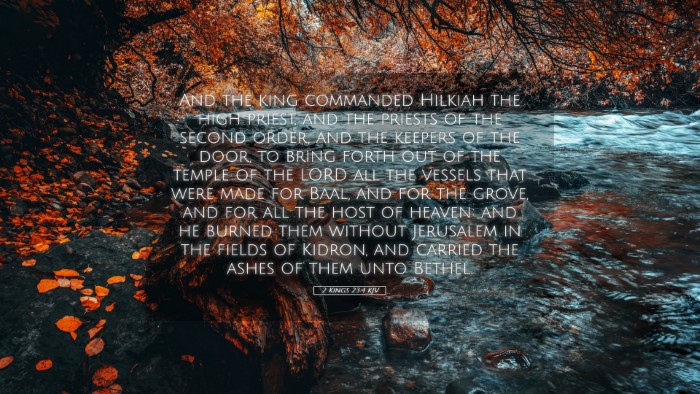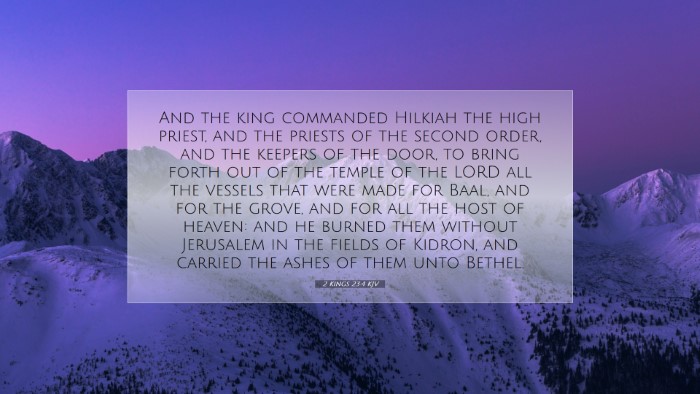Commentary on 2 Kings 23:4
Verse Context: 2 Kings 23:4 states, “And the king commanded Hilkiah the high priest, and the priests of the second order, and the keepers of the door, to bring forth out of the temple of the Lord all the vessels that were made for Baal, and for the grove, and for all the host of heaven; and he burned them without Jerusalem in the fields of Kidron, and carried the ashes of them unto Bethel.” This pivotal moment in the history of Judah marked the cleansing of the temple and a significant reform initiated by King Josiah.
Introduction
The reforms of King Josiah are significant in the narrative of the Old Testament. Under his reign, a spiritual revival began, which sought to eliminate idolatry and restore the rightful worship of Yahweh. This verse encapsulates a crucial step in this movement, showcasing Josiah's commitment to purging the land of false worship. Public domain commentaries provide a deeper understanding of this event's implications and theological significance.
Summary of Commentaries
Matthew Henry's Commentary
Matthew Henry emphasizes the necessity of reform in worship and the importance of a leader who is courageous enough to confront idolatry. He notes that the command to remove vessels made for Baal represents a proactive approach to purifying worship. Josiah, as king, not only sought to obey God but also to lead his people back to fidelity. The act of burning these items outside Jerusalem symbolizes a complete rejection of idolatry, as the flames consumed what was previously sacred to the worship of false gods.
Henry remarks on the role of Hilkiah the high priest, highlighting that a restoration of true worship requires collaboration among leaders. The priesthood's participation signifies a communal effort, reinforcing the idea that true revival must involve the entire nation, not just the monarchy. This act also illustrates the seriousness with which Josiah treated the covenantal relationship between God and Israel.
Albert Barnes' Notes on the Bible
Albert Barnes provides a historical overview, reflecting on the state of idolatry in Judah prior to Josiah's reforms. He notes that the vessels for Baal and other idols had been widespread and deeply entrenched in the culture. Barnes interprets Josiah’s command as an act of national repentance and a commitment to restoring the integrity of true worship in the temple. He observes that the burning of these vessels outside the city signifies their total rejection and serves as a powerful message against idolatry.
Furthermore, Barnes points out the importance of Bethel, the former site of worship for the northern kingdom of Israel. By carrying the ashes of the burned vessels to Bethel, Josiah aimed to symbolically cleanse not only Judah but also remind the remnants of Israel about the need for unity in following Yahweh. This action serves to highlight the broader covenantal themes of the Old Testament, emphasizing God's sovereignty over both kingdoms.
Adam Clarke's Commentary
Adam Clarke focuses on the theological implications of Josiah’s actions, arguing that this reform illustrates the seriousness with which God views idolatry. Clarke posits that the destruction of the vessels was not merely political; it represented a spiritual warfare against the systemic corruption of worship in the nation. Josiah's passionate actions reflect his heart for God and his desire to align the nation with divine purposes.
Clarke also highlights Hilkiah the high priest's obedience during these reforms, showing that leadership in spiritual matters often requires both courage and commitment. He notes the importance of returning to the Scriptures, suggesting that this act of purification would lead to a rediscovery of God's Word, paving the way for deeper spiritual renewal among the people. Clarke's commentary invites scholars to reflect on how contemporary leaders can draw inspiration from Josiah’s example in dealing with idolatry in their own contexts.
Theological Implications
This verse is significant for several reasons:
- Idolatry’s Destructive Nature: The removal and destruction of the vessels underscore the destructive impact of idolatry on a community’s relationship with God. Each vessel represents a covenant violation that demands corrective action.
- Leadership and Responsibility: Josiah's decisive leadership showcases the weight and influence of a righteous leader. The call for reform rests heavily on those in positions of authority.
- Community Involvement: The collaborative effort between the king and the high priest illustrates that spiritual renewal is not just an individual pursuit but a collective responsibility. This aspect is vital for contemporary church leaders as they navigate issues of idolatry in modern contexts.
- Significance of Symbolic Actions: The burning of the vessels outside the city signifies the complete rejection of idolatry. In a similar vein, churches and communities today must consider what symbolic actions might signal their rejection of contemporary forms of idolatry.
Conclusion
The transformation during King Josiah’s reign captured in 2 Kings 23:4 is a timeless reminder of the necessity of turning away from false gods and returning to authentic worship of the Lord. This narrative echoes throughout Scripture, particularly in the prophetic warnings against idolatry. By combining insights from Matthew Henry, Albert Barnes, and Adam Clarke, this commentary highlights how theological reflection on these events can inform current practices in worship and community engagement. For pastors, theologians, and scholars alike, the call to purify worship and reject idolatry remains pertinent, urging continual vigilance against distractions that can lead the faithful astray.


